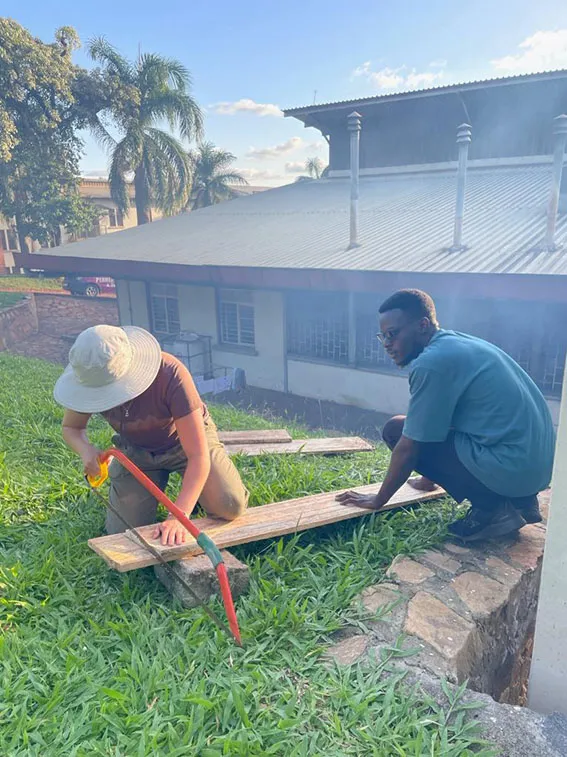By Kefa Senoga
In the summer of 2022, a team of three students from Dartmouth College in the USA state of New Hampshire were in Mukono, home of the main campus of Uganda Christian University (UCU), to actualize a solar water heater project designed to help the users save money, improve the health of the kitchen staff and reduce the amount of carbon output to the environment.
The three students, with their team leader, Stephen Doig, an expert in mini-grid development and energy efficiency, were joined by a team of UCU faculty and students to set up the water heating system at the UCU kitchen.
Again, this summer, the Dartmouth team, this time composed of five students, and again with Doig as their leader, was back in Mukono. The team that was at UCU from mid-June to mid-July, did maintenance works on the system they set up last year, as well as double its capacity and make refinements.

Anna Hugney led fellow students Emily Liu, Jack McMahon, Rujuta Pandit and Avery Widen. At UCU, they were joined by Okot Innocent, a UCU final-year student of engineering, to offer domestic expertise.
According to Hugney, they were mainly involved in maintenance of the system.
“Upon arriving at UCU, we realized that the PPR (polypropylene random copolymer plastic) piping at the system was beginning to deteriorate because of the intense sun and heat, and could become dangerous for users and consumers,” Hugney said.
To solve this challenge, the 24-year-old noted that they swapped the PPR in the system with copper piping, which is far more resilient to hot temperatures and can last up to 20 years.
“While installing the new copper piping, we redid the clamp system to hold the pipes up in the shed and insulated each piece of copper,” said Hugney, who, along with her classmates, was visiting Uganda for the very first-time.
A data log-in system that was put in place to monitor temperatures and had broken down was also fixed. Hugney’s colleagues – McMahon and Widen – uploaded the new code to the system designed to monitor the temperature of the water in the tanks, and the system performance, before returning to the United States.
Since the water heater project is a pilot venture, everyone was adjusting and learning, with some even taking lessons from mistakes made. Okot said the system’s performance was affected because the “cooks in the UCU kitchen didn’t learn how to properly use it, resulting in low temperatures and lukewarm water.”
Some successes
Zachariah Owino, the Head Chef at the UCU dining hall, said the system has helped them save on time and the energy required to heat water to the boiling point, especially while preparing breakfast for the students. He said they also now save more than three tons of firewood per semester, meaning that sh450,000 (about $123) worth of firewood is saved.
Before the system was installed, every week, the UCU kitchen was using 10 tons of firewood, which translated to sh1.5million (about $400). In a year, firewood worth sh63million (about $16,700) was being spent on preparing meals. Now with the system, a reduction of over eight metric tons of firewood and 1.2 metric tons of carbon dioxide emitted into the atmosphere is expected to be realized.
Such success stories present good news to the global efforts to conserve the environment and mitigate effects of climate change, including the Sustainable Development Goal 7, which calls for the expansion of infrastructure and upgrade of technology for supplying modern and sustainable energy services for all in developing countries by 2030.
According to Uganda’s environment watchdog, the National Environment Management Authority, from 1990 to 2015, Uganda lost 63% of its forests. The need for wood fuel and charcoal contributed to this rate of destruction of the forest cover.
The UCU-Dartmouth collaboration has been a two-way affair. Hugney said that they got fascinated by the biogas plant at UCU, noting that it is one project they look forward to replicating back at Dartmouth “because the United States has a lot of food waste which can be used for making biogas.” The biogas plant at UCU involves decomposing food waste, which is mostly obtained from the kitchen. The decomposed matter produces methane gas, which is used for cooking.


